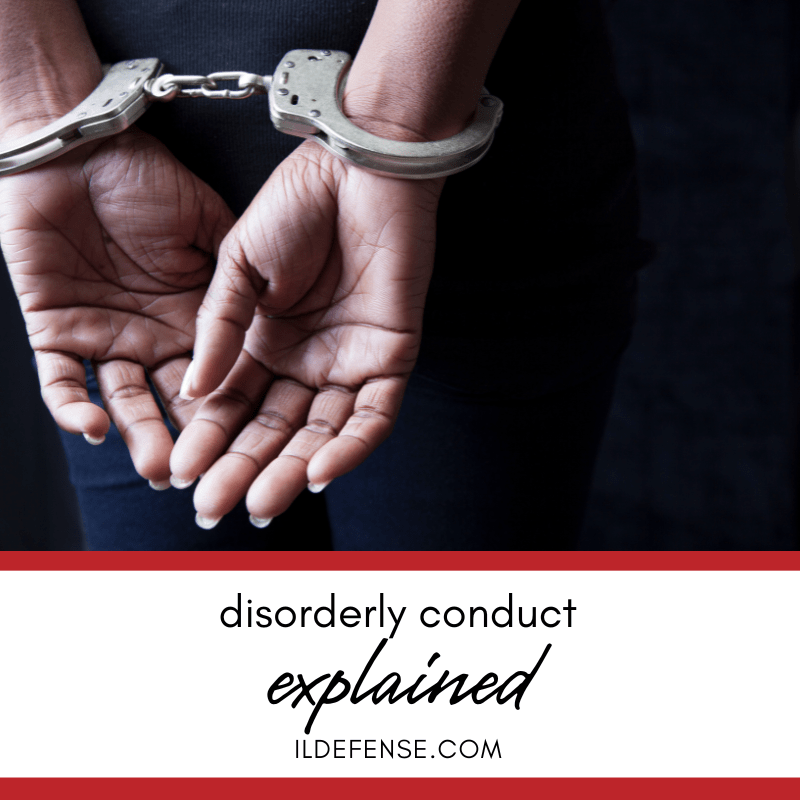
Disorderly conduct is a broad legal term that encompasses a variety of behaviors. Understanding what constitutes disorderly conduct in Chicago, as well as the potential penalties, can help you navigate the legal system if you are accused of this offense.
Disorderly Conduct in Chicago, Explained
If you’re accused of disorderly conduct in Chicago, it’s essential to understand the specifics of the charge. This guide explains the following:
- Definition of disorderly conduct
- Common examples of disorderly conduct
- Potential penalties for disorderly conduct
- Defending against a disorderly conduct charge
- Frequently asked questions
Here’s a closer look at each.
Definition of Disorderly Conduct
Disorderly conduct, under Illinois law, is a broad term used to describe actions that disturb the peace, alarm others, or provoke a public disturbance. The law defines disorderly conduct in various ways, covering a range of activities that disrupt public order. These behaviors can occur in both public and private settings and can be directed at individuals, groups, or the general public. The key aspect of disorderly conduct is that the behavior must be likely to cause or actually cause a disturbance.
Common Examples of Disorderly Conduct
Disorderly conduct can include a wide variety of actions. Common examples in Chicago include:
- Public Intoxication: Being visibly drunk or under the influence of drugs in public.
- Fighting or Brawling: Engaging in physical altercations in public places.
- Disturbing the Peace: Loud or disruptive behavior, such as yelling or playing music at an excessive volume.
- False Reporting: Making false reports to law enforcement, such as calling in a fake emergency.
- Loitering: Remaining in a place without a lawful purpose, especially if it obstructs others.
- Trespassing: Entering or remaining on someone else’s property without permission.
These actions can lead to charges of disorderly conduct, especially if they disrupt public order or cause alarm.
Related: Illinois criminal defense blog
Potential Penalties for Disorderly Conduct
The penalties for disorderly conduct in Chicago can vary depending on the severity of the behavior and any prior offenses. Generally, disorderly conduct is classified as a misdemeanor, but certain actions can elevate the charge to a felony. Penalties can include fines, community service, probation, and imprisonment. For a misdemeanor, fines can range from $75 to $2,500, and imprisonment can last up to 30 days. Felony charges can result in higher fines and longer imprisonment terms. The specific penalty will depend on the circumstances of the case and the discretion of the judge.
Defending Against a Disorderly Conduct Charge
If you are charged with disorderly conduct, it is crucial to build a strong defense. Working with a Chicago criminal defense lawyer can significantly improve your chances of a favorable outcome. Your lawyer will review the details of your case, gather evidence, and develop a defense strategy. Common defenses include arguing that your behavior did not meet the legal definition of disorderly conduct, that there was no intent to disturb the peace, or that your actions were protected by free speech rights. Your lawyer may also negotiate with the prosecution to reduce the charges or seek alternative sentencing options, such as community service or probation, instead of jail time.
Related: Are minors entitled to criminal defense lawyers in Illinois?
FAQ About Disorderly Conduct in Chicago
Check out these commonly asked questions about disorderly conduct in Chicago. If you don’t see your question here, please call our office and we’ll find you the answers you need.
What Should I Do If I’m Accused of Disorderly Conduct?
If you’re accused of disorderly conduct, remain calm and cooperate with law enforcement. Avoid making any statements until you have consulted with a lawyer. Contact a Chicago criminal defense lawyer as soon as possible to discuss your case and start building your defense.
Can Disorderly Conduct Charges Be Dropped?
Yes, disorderly conduct charges can be dropped, but it depends on the specifics of the case. Your lawyer can negotiate with the prosecution to have the charges reduced or dismissed, especially if there is insufficient evidence or if your behavior does not meet the legal definition of disorderly conduct.
What Are My Rights If I’m Arrested for Disorderly Conduct?
If you’re arrested for disorderly conduct, you have the right to remain silent and the right to an attorney. Exercise these rights to protect yourself and avoid self-incrimination. Your lawyer can advise you on the best course of action and represent you during legal proceedings.
Related: Can you refuse to talk to the police?
How Can a Lawyer Help Me with a Disorderly Conduct Charge?
A lawyer can help you by providing legal advice, developing a defense strategy, negotiating with the prosecution, and representing you in court. Having a lawyer ensures that your rights are protected and that you receive a fair trial.
Do You Need to Talk to an Attorney?
If you’ve been accused of a crime, we may be able to help you – and don’t worry: It’s completely confidential. Call us at 847-920-4540 or fill out the form below to schedule your free, private consultation with an experienced and skilled Chicago criminal defense attorney now.
Contact Us
"*" indicates required fields








